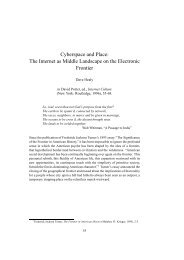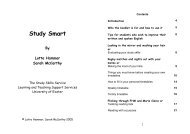PDF - The Metaphysics of Virtual Reality - University of Exeter
PDF - The Metaphysics of Virtual Reality - University of Exeter
PDF - The Metaphysics of Virtual Reality - University of Exeter
Create successful ePaper yourself
Turn your PDF publications into a flip-book with our unique Google optimized e-Paper software.
103<br />
At the far end <strong>of</strong> distrust lies computer crime. <strong>The</strong> machine interface may amplify<br />
an amoral indifference to human relationships. Computers <strong>of</strong>ten eliminate the need to<br />
respond directly to what takes place between humans. People do not just observe one<br />
another, but become "lurkers." Without direct human presence, participation becomes<br />
optional. Electronic life converts primary bodily presence into telepresence, introducing<br />
a remove between represented presences. True, in bodily life we <strong>of</strong>ten play<br />
at altering our identity with different clothing, masks, and nicknames, but electronics<br />
installs the illusion that we are "having it both ways," keeping our distance while<br />
"putting ourselves on the line." On-line existence is intrinsically ambiguous, like the<br />
purchased passion <strong>of</strong> the customers in the House <strong>of</strong> Blue Lights in Gibson’s Burning<br />
Chrome: "<strong>The</strong> customers are torn between needing someone and wanting to be alone<br />
at the same time, which has probably always been the name <strong>of</strong> that particular game,<br />
even before we had the neuroelectronics to enable them to have it both ways." 8 As<br />
the expanding global network permits the passage <strong>of</strong> bodily representations, "having<br />
it both ways" may reduce trust and spread cynical anomie.<br />
A loss <strong>of</strong> innocence therefore accompanies an expanding network. As the online<br />
culture grows geographically, the sense <strong>of</strong> community diminishes. Shareware<br />
worked well in the early days <strong>of</strong> computers, and so did open bulletin boards. When<br />
the size <strong>of</strong> the user base increased, however, the spirit <strong>of</strong> community diminished, and<br />
the villains began appearing, some introducing viruses. Hackers invisibly reformatted<br />
hard disks, and shareware s<strong>of</strong>tware writers moved to the commercial world. When we<br />
speak <strong>of</strong> a global village, we should keep in mind that every village makes villains,<br />
and when civilization reaches a certain degree <strong>of</strong> density, the barbaric tribes return,<br />
from within. Tribes shun their independent thinkers and punish individuality. A global<br />
international village, fed by accelerated competition and driven by information, may<br />
be host to an unprecedented barbarism. Gibson’s vision <strong>of</strong> cyberspace works like a<br />
mental aphrodisiac, but it turns the living environment—electronic and real—into a<br />
harsh, nightmarish jungle. This jungle is more than a mere cyberpunk<br />
8 William Gibson, Burning Chrome (New York: Ace Books, 1987), p. 191.
















